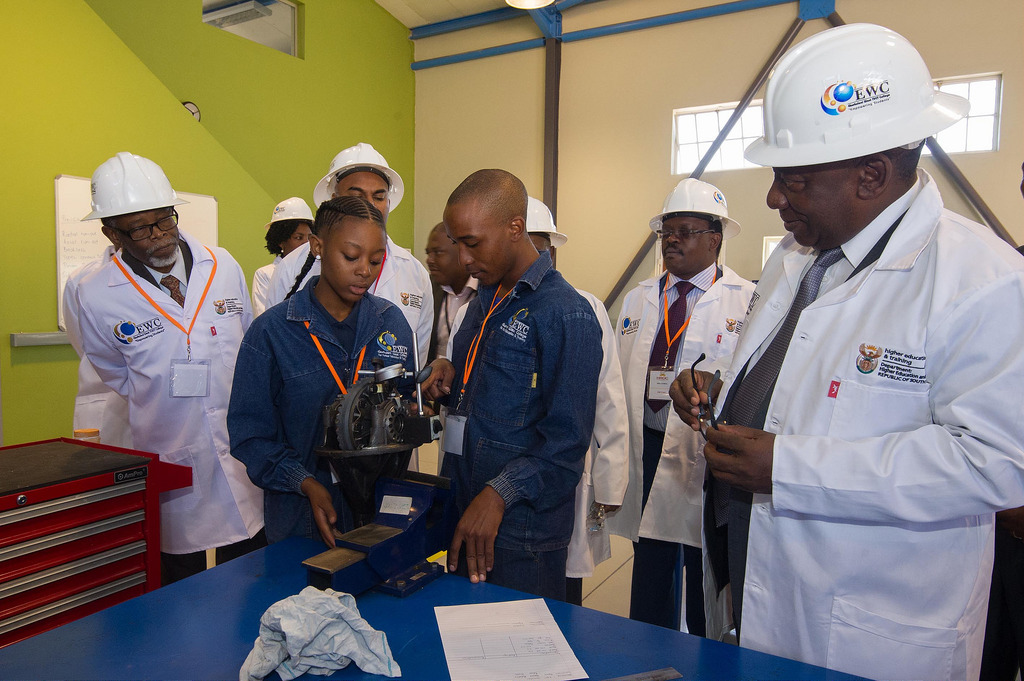When the minister of health Dr Aaron Motsoaledi, announced that Professor Bongani Mayosi would be honoured with a special provincial funeral, it was the official seal that said of the late dean of the faculty of health sciences at the University of Cape Town: “South Africa thanks you and is infinitely indebted to you.” When you stepped into hall 3 of the Cape Town Convention Centre for that funeral, you could feel something in the air.
There was presence, power, whispers of the ancestors, subtle tears of mourners and the gently audible disbelief of some at the fact that they were indeed sitting where they were to commemorate the great Professor and Doctor whose face flashed across the screens above them, suspended from the roof. Unlike many state funerals, Professor Mayosi’s didn’t have strong undertones of the political landscape flowing beneath it and guiding its trajectory. There were themes of awe and gratitude for a person who, like so many, was raised and educated in the humbler parts of the nation and, most importantly, imbued with the values thereof. The theme of mental health, often hushed and sometimes considered taboo in Black communities, emerged regularly but as it reared its head it often retreated.
Professor Mayosi was a groundbreaker though, a pioneer of the highest world-renowned calibre, not only in his field, but in his very fibre as a human being. “Whenever he spoke of innovation, he would say to me, ‘Bavna, we mustn’t be innovative, we must be groundbreaking,'” Dr Bhavna Patel, Mayosi’s colleague at Groote Schuur Hospital, said. Some speakers intimated that perhaps his funeral was another groundbreaking moment that would bring mental health further and more directly into the public light.
“I will be failing myself and the entire family, if I don’t say this,” said Sipho Mayosi, Professor Mayosi’s brother, “without fear or favour; that I hope and wish and, in the same breath, demand, that the University of Cape Town heed the call made by the Black [Academic] Caucus to investigate the death and leave no stone unturned [on] the circumstances surrounding the death of my brother, so that we may have closure. Otherwise, his legacy would be in vain.”
UCT BAC Demands Thorough Investigation Into Prof Mayosi’s Death
Apart from playing a leading role in the discovery of a genetic gene that causes heart failure – a truly incredible achievement – speakers urged us to remember Professor Mayosi’s life not only for that life-changing discovery. Mayosi was a man who fervently followed through on his work with high quality and always placed the black African child first in whatever he did. He was a mentor who loved students and was unapologetic in wanting to help nurture more black African doctors. While many on social media stressed his #BlackExcellence, there was another message at his funeral, an undeniable message that was in itself revolutionary: Professor Mayosi was excellent, pure and simple.
He finished matric at St. John’s College in uMthatha with 6 distinctions at only 15 and registered for his BMedSci immediately after – Mayosi started studying towards becoming a doctor at only 16 years old – graduating in 1986. Three years later, in 1989, he graduated with his MBChB: both at the University of KwaZulu-Natal, both cum laude.
Family members playfully discussed that his desire to emulate his father, a gynecologist, saw him go above and beyond him. However, Aaron Motsoaledi begged to differ, as it was none other than the minister of health who lead Mayosi’s orientation group as he entered tertiary education. “I met Bongani exactly 35 years ago when he was a 16 year old lad at the Natal Medical School […] When he was in first year, I was in my final year but I was also the president of the SRC and I was tasked with orientation for new students,” Motsoaledi said. “[That was] a class that produced two people who became deans [Professor Ncoza Dlova & Professor Bongani Mayosi] at the same time in the medical schools of this country… so I may not be wrong to boast that my orientation was devastatingly on point.”
Whatever the impact of Motsoaledi’s orientation, Mayosi thrived at university. Dr Fundile Nyati, who was by his side since high school, explained how his late friend translated his success at school to university, “When he did his matric he was the top performer in the school and the Transkei homeland […] When he got home after class, he would rewrite the notes for himself and throw the lecturer’s notes away and his notes were the ones we wanted… During the final clinical exam in 6th year, he was so good that when he was examined by the external examiner there was a crowd of registrars who wanted to hear what his answers were,” said Nyati, who has recently revealed to the public how he has grappled with depression for the past 20 years.
Professor Phakeng: “That day he was called a sellout. He just couldn’t deal with.â€
The talk of Mayosi’s tragic passing was compounded by the role that depression played. In the context of Black families, depression often remains unaddressed, whether a university dean or not. When speaking to UCT’s Medical School after his passing, Vice-Chancellor, Professor Mamokgethi Phakeng said, “I asked the family if Professor Mayosi had a history of depression and they said, “No, he didn’t” – until 2016, until that day he was called a coconut, until that day he was called a sellout and he just couldn’t deal with it. It affected him.” When Mayosi’s sister, Advocate Ncumisa Mayosi, spoke about her brother in hall 3, it was clear that the position of Dean had an impact on him. “Bongani’s lack of belief in himself and his abilities began when he took up his position as the Dean […] The vitriolic approach of students tore him down. Personal insults and abuse were hurled at him without reason. He became withdrawn, he spoke less. He attempted to resign twice from his position as Dean, both times not accepted by the University,” she said.
From protesting students and staff, the institution’s suit-and-ties and higher-ups to social media commentators, one can only hope that the blame game regarding Mayosi’s passing is finished. However, it would be a shame, if not criminal, if all in the institution (from those on-the-ground to top-floor-executives) don’t look at the how a pervasive environment is created and perpetuated that not only Professor Mayosi suffered from.
The UCT council chairperson Sipho Pityana, acknowledge this when he offered words from the institution. “[The] final analysis may have been to create the space for a discussion about this demon called depression,” he said. “Many university students deal with mental health issues. Attention and concentration are severely compromised by depression. Our student wellness services has seen an exponential increase of students expressing mental health issues. We have to confront this […] We must not jump to accusatory and divisive conclusions. We must ask ourselves whether there is there enough institutional and peer support.”
UCT Vice Chancellor: #FeesMustFall Not To Blame For Prof Mayosi’s Death
There are lessons to learn. There are always lessons to learn. But Professor Bongani Mayosi’s passing allows us not only to learn lessons, but to appreciate and give thanks to a man who gave lessons. An incomparable mentor, a doctor renowned for his humanity and perseverance and a husband, father and leader who will never be forgotten, Professor Mayosi showed us what it was to be great and what could happen when a Black child, for whom the world constantly said no to, was tireless in following his dreams.
One of the greatest sons of the African soil, Professor Bongani Mawethu Mayosi, we say shukran for all you have done for your people and for the countless you have and will continue to inspire.
Featured image via Wikimedia Commons.

![UCT upper campus [wikimedia commons] [resized]](https://www.thedailyvox.co.za/wp-content/uploads/2014/08/UCT-upper-campus-wikimedia-commons-resized.jpg)







